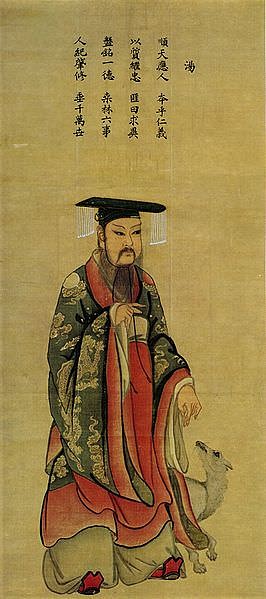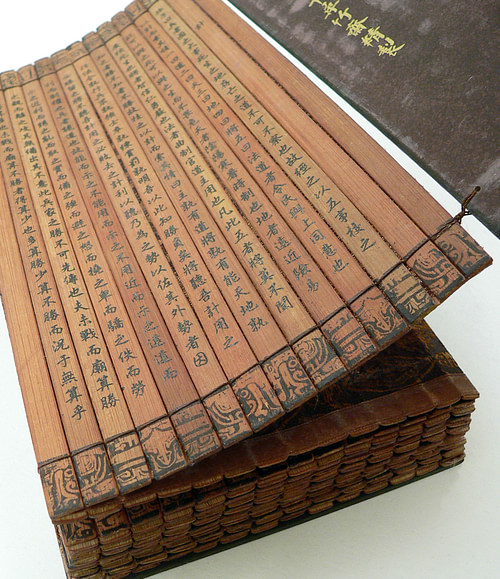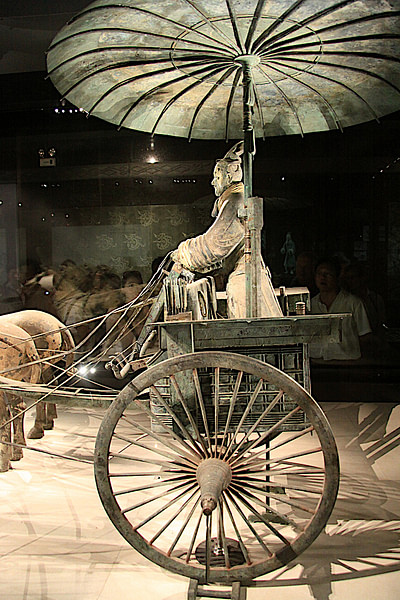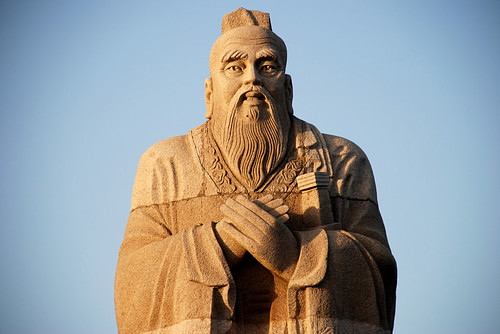Which Group Retained Much More Influence on Family Structure in China Than in Other Lands?
The Zhou Dynasty (1046-256 BCE) was amid the most culturally significant of the early on Chinese dynasties and the longest lasting of any in China'due south history, divided into two periods: Western Zhou (1046-771 BCE) and Eastern Zhou (771-256 BCE). It followed the Shang Dynasty (c. 1600-1046 BCE), and preceded the Qin Dynasty (221-206 BCE, pronounced "chin") which gave China its name.
Amongst the Shang concepts adult past the Zhou was the Mandate of Heaven – the belief in the monarch and ruling house as divinely appointed – which would inform Chinese politics for centuries afterwards and which the House of Zhou invoked to depose and supersede the Shang.
The Western Zhou period saw the ascent of decentralized land with a social bureaucracy corresponding to European feudalism in which land was owned past a noble, honor-bound to the king who had granted it, and was worked by peasants. Western Zhou roughshod just earlier the era known equally the Leap and Fall Period (c. 772-476 BCE), named for the state chronicles of the time (the Spring and Autumn Annals) and notable for its advances in music, poetry, and philosophy, particularly the development of the Confucian, Taoist, Mohist, and Legalist schools of thought.
Eastern Zhou moved the capital to Luoyang and continued the Western Zhou model but with an always-increasing breakdown of the royal Chinese government which resulted in the merits that the Zhou had lost the Mandate of Sky. The weakness of the rex's position gave rise to the chaotic era known equally the Warring States Menstruation (c. 481-221 BCE) during which the seven separate states of Prc fought each other for supremacy. This period ended with the victory of the state of Qin over the others and the establishment of the Qin Dynasty which tried to erase the accomplishments of the Zhou in order to establish its own primacy.
The Zhou Dynasty made significant cultural contributions to didactics, literature, philosophical schools of thought, every bit well equally political & religious innovations.
The Zhou Dynasty made significant cultural contributions to agriculture, education, military organization, Chinese literature, music, philosophical schools of idea, and social stratification every bit well equally political and religious innovations. The foundation for many of these developments had been laid past the Shang Dynasty but the class in which they came to be recognized is entirely credited to the Zhou.
The civilization they established and maintained for almost 800 years enabled the development of the arts, metallurgy, and some of the virtually famous names in Chinese philosophy, among them Confucius, Mencius, Mo Ti, Lao-Tzu, and Dominicus-Tzu all of whom lived and wrote during the period known as the time of the Hundred Schools of Thought during which individual philosophers established their own schools. The contributions of the Zhou Dynasty provided the foundation for the development of Chinese culture by those that followed, nearly notably the Han Dynasty (202 BCE-220 CE) which would fully recognize the value of the Zhou Dynasty's contributions.
Fall of the Shang & Rise of the Zhou
Prior to the Zhou was the Shang Dynasty who overthrew the Xia Dynasty (c. 2700-1600 BCE), claiming it had get tyrannical, and the Shang leader, Tang (dates unknown) then stabilized the region and initiated policies encouraging economic and cultural advances. The Shang made the about of the fertile soil on the banks of the Yellow River to produce abundant harvests, providing more food than required, the surplus of which and then went toward trade. The resulting prosperity allowed for the development of cities, (some on a big scale, such as Erligang), arts, and culture.

King Tang of Shang
The gods' approval of a king was axiomatic in the prosperity of the country and the general well-being of the people. Whatsoever decline in either was interpreted as a sign the monarch had cleaved his contract with the gods and should be deposed. The last Shang emperor, Zhou (also given as Xin), became every bit tyrannical as the earlier Xia kings had been. He was challenged by Rex Wen of Zhou (l. 1152-1056 BCE) and was overthrown by Wen's second son, King Wu, who reigned 1046-1043 BCE as the offset king of the Zhou Dynasty.
Western Zhou
King Wu at offset followed the paradigm of the Shang in establishing a cardinal government on either side of the Feng River known every bit Fenghao. Wu died presently later, and his blood brother, Dan, the Duke of Zhou (r. 1042-1035 BCE), took command of the regime equally regent for Wu's immature son, Cheng (r. 1042-1021 BCE). The Knuckles of Zhou is a legendary character in Chinese history as a poet-warrior and author of the famous volume of divination, the I-Ching. He expanded the territories eastward, and ruled respectfully, abdicating when the son of Wu came of age and took the throne as King Cheng of Zhou. Not every region under Zhou control admired their policies, however, and rebellions throughout the vast realm broke out, inspired past factions wishing to rule themselves.

Map of Western Zhou
A centralized government could not maintain the large territory that had been conquered and so the ruling business firm sent out trusted generals, family unit members, and other nobles to institute smaller states which would be loyal to the king. The policy of fengjian ("institution") was instituted which decentralized the government and allotted land to nobles who acknowledged the supremacy of the Zhou king. The fengjian policy established a feudal organization and social bureaucracy which ran, top to lesser:
- King
- Nobles
- Gentries
- Merchants
- Laborers
- Peasants
Each noble formed his own separate state with its own legal organisation, tax code, currency, and militia. They paid homage and taxes to the Zhou rex and provided him with soldiers when necessary. In order to strengthen the king's position, the Mandate of Sky concept was more fully developed. The male monarch fabricated sacrifices at the capital on behalf of the people and the people honored him with their loyalty and service.
This was 1 of the few times in China'due south history that the upper & lower classes worked together for the greater common good.
The fengjian policy was and so successful, producing such abundance of crops, that the resultant prosperity validated the Zhou as possessing the Mandate of Heaven. The wealth that was generated encouraged the and then-called well-field system which divided lands between those cultivated for nobility and the king, and those worked by and for the peasantry. This was one of the few times in People's republic of china'southward history that the upper and lower classes worked together for the greater common good.
The Zhou civilisation, naturally, flourished with this kind of cooperation. Works in bronze became more than sophisticated and the metallurgy of the Shang, overall, was improved upon. Chinese writing was codified and literature developed, as evidenced in the work known equally Shijing (the Book of Songs, equanimous 11th-7th centuries BCE), 1 of the 5 Classics of Chinese literature. The poems of the Shijing would have been sung at court and were thought to encourage virtuous behavior and pity for members of all social classes.
This time of prosperity and relative peace, however, could not terminal. Scholar Patricia Buckley Ebrey comments:
The decentralized dominion of the Western Zhou had from the beginning carried within information technology the danger that the regional lords would become and then powerful that they would no longer respond to the commands of the rex. As generations passed and ties of loyalty and kinship grew more than afar, this indeed happened. In 771 BCE, the Zhou rex was killed by an alliance [of tribesmen and vassals]. (38)
Western Zhou fell when invasions, most likely by the peoples known as the Xirong (or Rong), further destabilized the region. The dignity moved the capital to Luoyang in the east which gives the next period of Zhou history its name of Eastern Zhou.
Eastern Zhou
Past all accounts, the era of Eastern Zhou was cluttered and violent only managed to produce literary, creative, and philosophical works of startling originality and substance. The Jump and Fall Period which begins the era of Eastern Zhou withal retained some of the courtesy and decorum of the days of Western Zhou but that would not last for long. The separate states – Chu, Han, Qi, Qin, Wei, Yan, and Zhao - all had more power than the Zhou at Luoyang at this time. Even and then, it was yet thought that the Zhou held the Mandate of Heaven and so each state tried to evidence themselves the Zhou successor.
In the early years of the Leap and Autumn Period, knightly in boxing was still observed and all vii states used the aforementioned tactics resulting in a serial of stalemates since, whenever ane engaged with some other in battle, neither could gain an advantage. In time, this repetition of seemingly endless, and completely futile, warfare became just the mode of life for the people of Cathay during the era now referred to as the Warring States Menstruation. The famous work The Art of War past Sun-Tzu (fifty. c. 500 BCE) was written during this fourth dimension, recording precepts and tactics one could use to gain advantage over an opponent, win the war, and establish peace.

The Art of State of war by Lord's day-Tzu
How widely read The Art of War was at this fourth dimension is unknown simply Sun-Tzu was not the merely one who tried to stop the violence through stratagems. The pacifist philosopher Mo Ti (also given as Mot Tzu, l. 470-291 BCE) went to each state, offering his knowledge in strengthening a city's defenses besides as offensive tactics in battle. His idea was to provide each state with exactly the same advantages, neutralizing all, in the promise that they would realize the futility of farther warfare and declare peace. His plan failed, all the same, considering each state, like a die-hard gambler, believed that their next offensive would result in the big win.
A Qin statesman named Shang Yang (d. 338 BCE), post-obit Sun-Tzu'due south pb, advocated for total war, without regard to the onetime laws of chivalry, and stressed the goal of victory by whatsoever means at one's disposal. Shang Yang's philosophy was adopted by King Ying Zheng of Qin who embarked on a barbarous campaign of carnage, defeated the other states, and established himself every bit Shi Huangdi, the first Chinese emperor. The Zhou Dynasty had fallen, and the Qin Dynasty now began its reign over China.
Zhou Contributions
The Qin would disengage many of the advances of the Zhou but could not completely rewrite history. In the same way the Zhou had drawn on the accomplishments of the Shang, then the Qin did with the Zhou. The Zhou's advances in agriculture, for example, were kept and improved upon, notably irrigation techniques, dam building, and hydraulics which would be instrumental in Shi Huangdi's construction of the M Canal.
The use of cavalry and chariots in Chinese warfare (also originally Shang developments) were further developed by the Zhou and kept past the Qin. The Zhou had brought horsemanship to such a high level that it was considered a form of art and a requisite for the educational activity of princes. Horses were thought so important, they were ofttimes buried with their masters or sacrificed for the spiritual ability and protection their energy could provide to the deceased.

Chinese Qin Chariot
The well-nigh famous case of this is the tomb of Duke Jing of Qi (r. 547-490 BCE), found in Shandong Province in 1964 CE which, though withal not fully excavated shortly, is thought to contain the remains of 600 horses sacrificed to accompany the Knuckles into the afterlife. All of the states drew on the Zhou knowledge of horsemanship and Ying Zheng, in fact, fabricated full use of the chariot and cavalry units developed by the Zhou in subduing the other states.
The Zhou separation of an army into units, deployed in different directions in battle, was besides maintained by the Qin as was Zhou metallurgy. Shi Huangdi made the virtually of Zhou techniques in metalworking past forcing the subdued states to turn over their weapons which were melted down and turned into statues celebrating his reign.
The Zhou contributions which were discarded past the Qin were all in the areas of art and civilisation. The Spring and Autumn Menstruation and its time of the Hundred Schools of Thought had produced some of the near significant philosophical thinkers in the world. The major schools of thought were founded past Confucius (50. 551-479 BCE) whose famous Confucian precepts go along to inform Chinese civilisation, Lao-Tzu (l. c. 500 BCE) who codification and founded formal Taoism, and Han Feizi (l. c. 280-233 BCE), founder of the school of Legalism.

Confucius
There were also many bottom known, merely notwithstanding significant, philosophers such equally the sophist Teng Shih (50. c. 500 BCE), the hedonist Yang Zhu (l. 440-360 BCE), and the politician and philosopher Yan Ying (l. 578-500 BCE). Among the all-time-known later philosophers was the famous Mencius (also given as Mang-Tze, 50. 372-289 BCE) who would codify the works of Confucius, and Xun Kuang (l. c. 310 - c. 235 BCE) whose work, Xunzi, reimagined Confucian ideals with a more pessimistic, pragmatic vision. Except for the legalism of Han Feizi, which the Qin adopted as its national policy, the piece of work of all these philosophers was ordered destroyed; whatsoever which survived had been subconscious by priests and intellectuals at the hazard of their lives.
Zhou musical contributions were also undervalued by the Qin, though they were later recognized fully by the Han Dynasty. Central to the values of the Zhou Dynasty were the concepts of Li (ritual) and Yue (music and dance), commonly given as Li-Yue. Music was considered transformative, as explained by the scholar Johanna Liu:
Since the Zhou Dynasty, music has been considered as one important discipline in the curriculum including iv disciplines for cultivating the sons of royal family and eminent people from the State to be prominent future leaders. In the Book of Rites, it was said…'the direction of Music gave all honor to its 4 subjects of instruction, and arranged the lessons in them, following closely the poems, histories, ceremonies, and music of the former kings, in order to complete its scholars.' (Shen, 65)
Each slice of music had a respective dance and the combination of these was thought to non just improve the moral grapheme of the private but assistance in balancing the nature of the cosmos. Confucius believed music to be essential in cultivating a good grapheme, especially in a ruler, and that a lover of music would conduct himself, and his administration, justly.
The Book of Rites referenced by Liu is one of the classic Chinese texts which was produced during the Zhou Dynasty during the period of the Hundred Schools of thought. The Four Books and 5 Classics – which managed to survive the book called-for of the Qin – became the standard texts for Chinese education. They are:
- The Book of Rites (also known as The Book of Smashing Learning)
- The Doctrine of the Mean
- The Analects of Confucius
- The Works of Mencius
- The I-Ching
- The Classics of Verse
- The Classics of Rites
- The Classics of History
- The Leap and Autumn Annals
These works continue to exist studied in the present day and for the same reason: they are thought to not only educate an individual merely also elevate the soul and improve one's overall character.
Conclusion
These works were merely fabricated possible by the Zhou development of writing. The Zhou developed the Shang script Jiaguwen into the Dashuan, Xiaozhuan, and Lishu scripts which would lend themselves to the development of notwithstanding others. The Zhou'southward elevation of ancestor worship encouraged the development of religious thought and their vision of the Mandate of Heaven would continue to inform Chinese dynasties going forward for thousands of years.
If the Zhou had but produced philosophers such as Confucius and the others, information technology would be impressive enough, but they did far more than. In the Western Zhou period, they established a decentralized, merely cohesive, state which honored and inspired the people of all social classes, not only the noble and wealthy. They consistently improved upon what they had inherited from the Shang and looked for other ways to make their lives, and others', amend.
In the Eastern Zhou period, even amidst the chaos of constant warfare, they continued to develop fine art, music, literature, and philosophy of the highest quality. The Zhou Dynasty's reign of about 800 years, in fact, was so profoundly influential at every level of civilisation that even the destructive policies of the Qin could not erase information technology. Later the Qin brutal to the Han Dynasty, the cultural contributions of the Zhou were revived and, today, are indistinguishable from Chinese civilisation.
This commodity has been reviewed for accurateness, reliability and adherence to academic standards prior to publication.
Source: https://www.worldhistory.org/Zhou_Dynasty/
Posting Komentar untuk "Which Group Retained Much More Influence on Family Structure in China Than in Other Lands?"